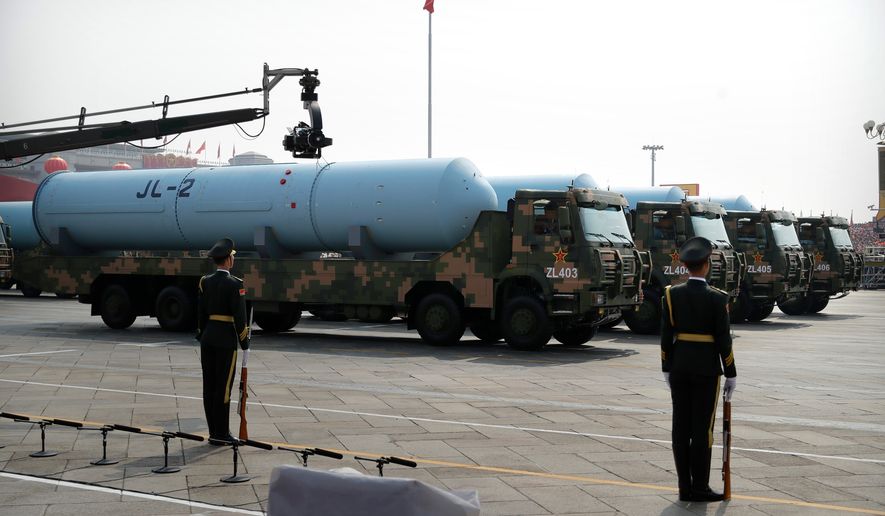A version of this story appeared in the daily Threat Status newsletter from The Washington Times. Click here to receive Threat Status delivered directly to your inbox each weekday.
U.S. military aircraft in the Indo-Pacific region are vulnerable to missile attacks from China, which has constructed hundreds of hardened aircraft bunkers in apparent preparation for war, a group of Republican lawmakers said in urging stronger aircraft defenses by the Air Force and Navy.
American military bases in the Indo-Pacific are under threat,” 13 Republican members of Congress wrote Wednesday in a new letter to Air Force Secretary Frank Kendall and Navy Secretary Carlos Del Toro. “The time to act is now.”
China’s current strike weapons can attack all U.S. bases in the region, including Okinawa and facilities on Guam and the Commonwealth of the Northern Mariana Islands, the letter says.
“U.S. bases in the region have almost no hardened aircraft shelters compared to Chinese military bases,” the letter said.
The letter was organized by the new chairman of the House Select Committee on the Chinese Communist Party, Michigan Rep. John Moolenaar, and Florida Sen. Marco Rubio.
Spokesmen for the Air Force and Navy secretaries did not immediately respond to a request for comment. An Indo-Pacific command spokesman also did not immediately respond to a request for comment.
Congressional researchers found that in the past 10 years, China constructed over 400 hardened aircraft shelters for its warplanes. By contrast, the U.S. military has built just 22 such shelters in the Indo-Pacific region. Hardened hangars use reinforced materials to withstand bombing and missile attacks.
The Pentagon is requesting $9 billion in its current budget to bolster forces in the Pacific. The Indo-Pacific command, however, has identified $11 billion in unfunded priorities. The letter contends that less than 2% of the $15.7 billion the Pentagon will spend on military construction in the next fiscal year will be used for base protection.
“Unclassified analysis suggests China has enough weapons to overwhelm our air and missile defenses protecting those bases,” the letter states. “We are concerned about the alarming lack of urgency by the Department of Defense in adopting” adequate defensive measures.
China has sharply expanded its missile forces that can be used for strikes in the region, now totaling more than 2,800 intermediate-, medium-, and short-range ballistic missiles and ground-launched cruise missiles, according to the Pentagon’s latest annual report on the Chinese military.
The Pentagon report said China’s warplanes include 1,300 fourth-generation fighters out of a total of 1,900 fighters. More advanced fighters, including the J-20 are being deployed. Its bomber forces also expanded with new H-6 bombers, including extended range variants. A new H-20 bomber is being developed.
Preparing for war
Analysts say the moves signal Beijing is preparing for a future conflict with the United States, possibly over Taiwan.
Recent war games simulating a conflict with China over Taiwan revealed that 90% of U.S. aircraft losses took place from ground strikes rather than air combat, the letter states. The GOP lawmakers said hardened aircraft shelters are one of the most cost-effective passive defenses for protecting military bases, but Pentagon regulations are delaying military construction and have driven up costs for projects on Guam and the Marianas.
Many U.S. bases in East Asia lack hardened structures and aircraft often are stored close together for easier maintenance, making them “highly vulnerable to Chinese strikes,” the letter said.
Anti-aircraft and missile defenses on military bases are important for protection bases but will not be enough to protect aircraft.
Defense analysts Thomas Shugart and Timothy A. Walton told the select committee that the sharp difference between the numbers of new U.S. and Chinese hardened shelters was staggering.
American military bases in Japan and South Korea were the locations for the 22 new hardened aircraft hangars. However, none were built on Guam or the Marianas, U.S. territory that likely will be targeted in a future conflict with China.
The lawmakers said hardened shelters for warplanes will not provide complete protection from precision missile attacks. But the bunkers offer significantly more protection from smaller submunitions than movable steel shelters currently in use.
Storing aircraft in hardened shelters also would force China to use more of its forces to destroy each aircraft and thus increasing the survivability of U.S. aircraft in a war.
“Constructing hardened shelters for all our air assets may not be economically feasible or tactically sensible, but the fact that the number of such shelters on U.S. bases in the region has barely changed over a decade is deeply troubling,” the lawmakers said. “If our bases in the Indo-Pacific lack the resilience to survive attacks and continue operating, our ability to deter China and respond quickly in the Taiwan Strait will be greatly diminished.”
The letter called on Mr. Kendall and Mr. Del Toro to answer several questions including discussing plans for passive defenses like aircraft shelter hardening, including whether increased funding will be requested. Other GOP House member signing the letter included: Rep. Robert J. Wittman of Virginia; Rep. Blaine Luetkemeyer of Missouri; Rep. Andy Barr of Kentucky; Rep. Dan Newhouse of Washington. Rep. Darin LaHood of Illinois; Rep. Neal P. Dunn of Florida; Rep. Jim Banks of Indiana; Rep. Dusty Johnson of South Dakota; Rep. Michelle Steel of California; Rep. Ashley Hinson of Iowa; and Rep. Carlos A. Gimenez of Florida.
• Bill Gertz can be reached at bgertz@washingtontimes.com.




Please read our comment policy before commenting.